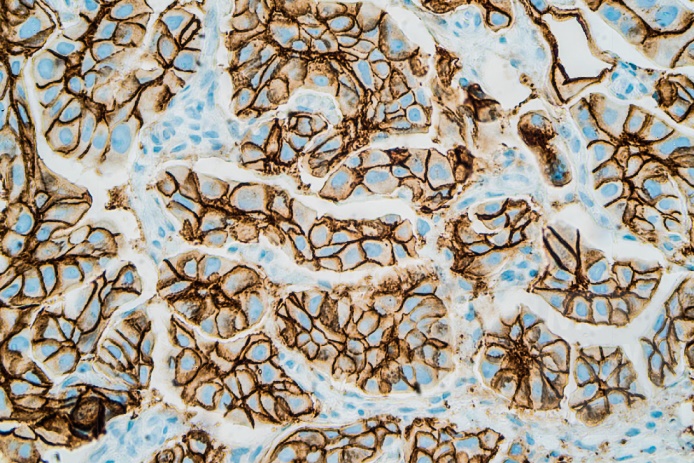Occurring in mammary glands and closely associated tissues, breast cancer is the most common cancer observed in women. For example, in the United States, approximately 1 in 8 women (about 12%) will develop invasive breast cancer over the course of her lifetime. In terms of numbers, more than 276,000 new cases of invasive breast cancer are predicted to be detected among women in the United States in the year 2020. See also: Breast cancer and other breast disorders; Cancer; Oncology

Physical examinations and mammograms can be effective methods for early detection of breast cancer. Treatments for early-stage tumors include chemotherapy, radiation therapy, hormonal therapy, immunotherapy, and surgery (for example, lump removal or total mastectomy). In advanced or aggressive stages of breast cancer, though, women have fewer treatment options, and the risks of cancer metastasis (spread) to other areas of the body are significant in these stages. However, scientists have begun to utilize two experimental drugs—T-DXd and tucatinib—in separate trials that may prove to be effective treatment options for women whose breast cancer has spread to other areas of the body or has proven untreatable with other drugs. See also: Chemotherapy and other antineoplastic drug treatments; Immunotherapy; Mammography; Radiation therapy; Surgery
In one study, more than 250 women with aggressive HER2-positive breast cancers were treated with T-DXd. Women with HER2-positive cancers have a cell-surface protein called HER2 that is generated by an overactive cancer-promoting gene. The T-DXd chemotherapy drug was remarkably effective in reducing the prevalence and size of cancerous HER2 tumors. In particular, tumors in 61% of treated women shrunk by at least 30%, and no cancer was detected in 6% of patients following the treatment regimen. However, side effects related to the use of this drug were notable, including lung inflammation, low blood-cell counts, anemia, nausea, or fatigue. Researchers hope that the simultaneous use of anti-inflammatory drugs could alleviate these problems. See also: Tumor
In the second study, the drug tucatinib was effective in attacking HER2 tumors that had spread from the breast to the brain. In more than 600 cancer patients whose general prognosis was poor, tucatinib was observed to halt the worsening of initial brain tumors and to prevent further spreading of cancer cells into the brain. In particular, about 45% of patients receiving tucatinib for more than two years continued to live (in contrast to 75% of patients not receiving tucatinib who lost their lives to HER2 cancer). Similar to the T-DXd study, though, various side effects were noted, including nausea, fatigue, diarrhea, and minor liver dysfunction.
The companies sponsoring the use of T-DXd and tucatinib are seeking approval to conduct further trials in the United States, Europe, and Japan. If results continue to be positive, the two drugs might prove beneficial for many women facing aggressive forms of breast cancer.





